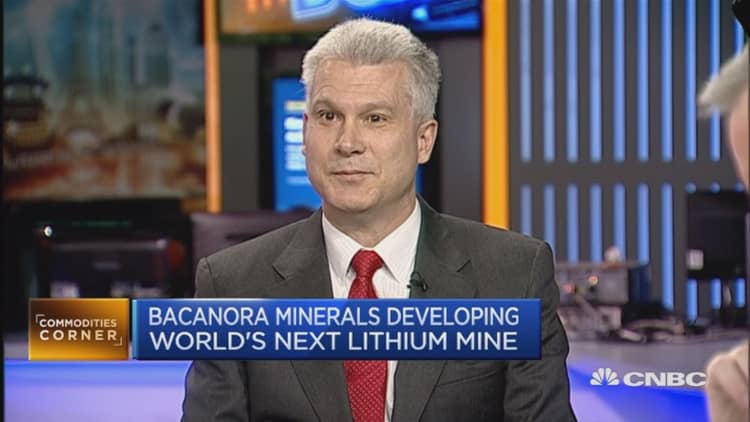It's been described as the latest "gold rush" in the ever-changing world of commodities, but new data has shone a light on the potential pitfalls for investors who are seeking sizeable returns from the metal lithium.
Lithium carbonate helps to power smartphones and hoverboards, but the real attraction for investors has been the nascent electric and hybrid vehicle sector. The emergence of firms like Tesla — which is building its own lithium factory in Nevada — has helped to boost its price.
However, data analysis firm Markit said Wednesday that the recent rush has also attracted plenty of doubters in the form of short sellers - those traders that bet that the price of a security will fall.
"The battery sector has attracted huge investment in recent years with lithium ... however this element could prove to be a limiting factor, creating bottlenecks in the electric car component supply chain," Simon Colvin, a research analyst at the company, said in a note.
Short interest surge
"Investors have been eager to take positions on the story in the last few weeks as the lithium related shares which make up the Global X Lithium (exchange traded fund), have returned nearly 13 percent since the start of the year, largely outperforming the rest of the global market."
Markit - which uses the amount of shares out on loan for a proxy on short selling - said that traders have doubled their positions in the global lithium firms which make up this exchange traded fund. It added that electric car manufacturers had seen the most shorting activity, but mining firms had experienced the largest jump in short interest.
"In the last three months shares have surged by 35 percent in Albemarle, a supplier of a number of lithium based products. With short interest at negligible levels 12 months ago, shares outstanding on loan have increased over four fold, rising to 8.2 percent," Colvin said.
The analyst added that FMC Lithium had also seen a large increase in shorting activity, rising over threefold in the past 12 months with 7.7 percent of shares outstanding on loan currently.
The 'new gasoline'

In a note last December, Goldman Sachs analysts predicted that the metal itself would be the "new gasoline" and said the abundant commodity was easy to store and would be a "key enabler of the electric car revolution."
Data is scarce compared to oil and gold, but London-based data firm Benchmark Minerals Intelligence (BMI) has information on recent price rises for the metal. In February, it said that lithium was going through its strongest ever period of price increases, and said the commodity's price was 47 percent higher than last year's average.
BMI has also highlighted potential raw material bottlenecks as the demand for electric vehicles accelerates and consequently predicts further upside risk for lithium prices, according to UBS who has worked with the data intelligence company.
A price peak?
But the rapid price surge has caused more than just Markit to doubt whether the rally is sustainable. Some economists are predicting prices to peak in 2017 with more factories coming along and adding to supply.
Lower oil prices might also be a downside risk as cheaper traditional gasoline causes consumers to hold onto their conventional models. There are also other technologies to contend with, according to Goldman Sachs, which pointed out that lithium wasn't the only battery type that could be adopted by the automobiles sector.
It also said that policymakers would have their part to play in the market as an end to subsidies could shake up demand, and therefore pricing. "There is a substantial risk that less favorable policy could slow (electric vehicle) adoption," it said in its report in December.





